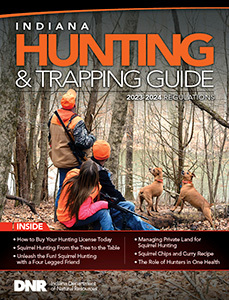Wildlife Health
The Role of Hunters in One Health

One Health is an approach to research, management, and outreach that recognizes the importance of human health and its direct relationship to the health of domestic animals, wildlife, and our shared environment. Together we can use this framework to monitor and manage the health of Indiana’s wildlife.
An example of how One Health and wildlife health are connected is demonstrated in the case of highly pathogenic avian influenza (HPAI). HPAI is caused by a virus that can infect both domestic and wild birds, and, on rare occasions, humans and other mammals.
In 2022, H5N1 HPAI was confirmed in a commercial turkey farm in Indiana. Since then, it has been confirmed in several wild bird species in Indiana (read more about this outbreak at on.IN.gov/avian-flu). During that time, hunters and wildlife biologists worked together to monitor this disease in our state’s waterfowl, primarily through surveillance of hunter-harvested waterfowl and hunters’ use of the DNR application for reporting sick and dead wildlife (on.IN.gov/sickwildlife). As a result of those efforts, DNR shared important health information with the public.
This One Health approach promoted cooperation, communication, and coordination between professionals and the public. This ultimately bolstered monitoring of the outbreak, recovered food safety, protected human health, and conserved biodiversity. As of April 2023, Indiana was declared HPAI-free in commercial facilities. Nevertheless, hunters and outdoor recreators should remain vigilant.
Hunters can participate in the One Health approach by:
- Reporting sick or dead wild animals at on.IN.gov/sickwildlife and avoiding the harvest of these wildlife
- Processing wild game and meats in well-ventilated areas
- Wearing gloves and washing hands before and after handling carcasses
- Refraining from eating, drinking, smoking, and eye touching during processing
- Double bagging wildlife remains before disposal
- Participating in wildlife diseases surveillance efforts
- Cooking meat to a safe internal temperature
- Practicing healthy pet habits (e.g. vaccinating pets, picking up pet waste, etc.)
- Removing litter and trash from public or private lands
The CDC’s website, cdc.gov/onehealth/index.html can provide more information on One Health.
Report Sick or Dead Wildlife
Do Report:
- Wildlife that appears sick or dead without obvious cause.
- Incidents involving the death of five or more animals.
- Recurring deaths of animals in the same location.
- Deer that appear sick.
- Incidents involving threatened or endangered species, regardless of the cause of death or the number of animals involved.
Don’t Report:
- Roadkill.
- Orphaned or injured animals.
- Bird window collisions.

